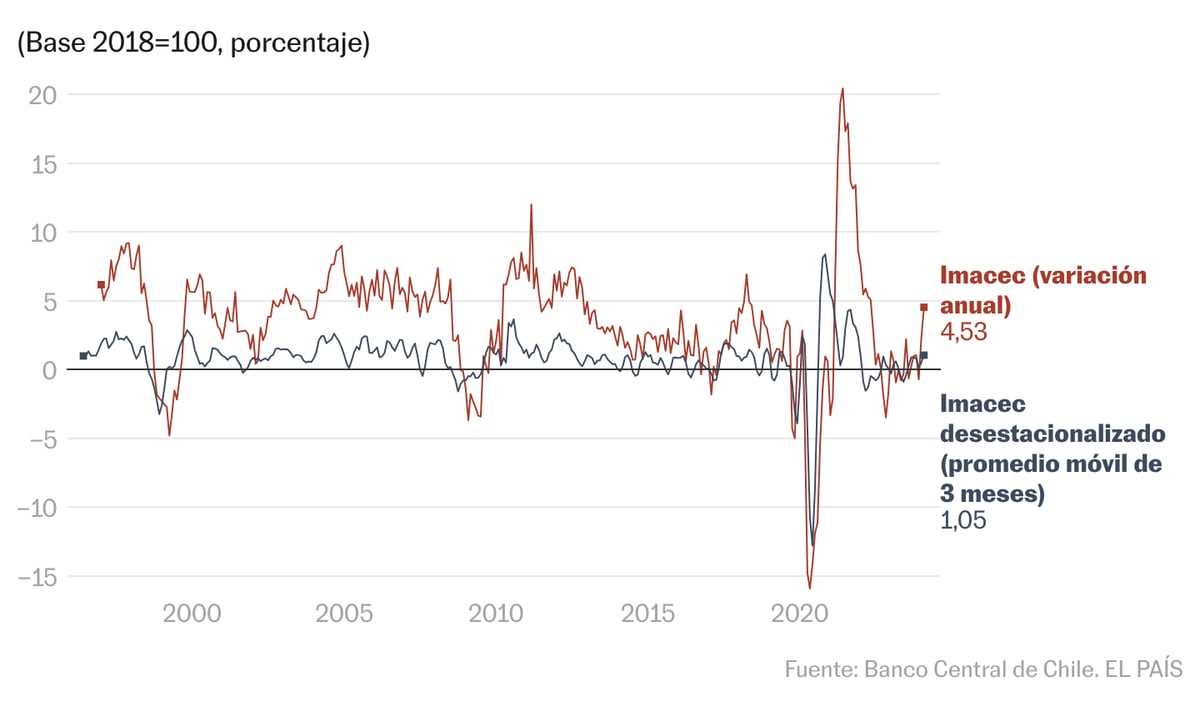A worker sets up an outdoor table at the reopening of a restaurant in Santiago, Chile, on Wednesday, September 2.Esteban Felix / AP
The gradual unconfinement of Chilean municipalities after the peak of COVID-19 in June, the measures to support household income and the possibility that citizens withdraw up to 10% of their pension savings have had a positive effect on the economy, according to the Central Bank of the South American country.
The decline in GDP in 2020 will be between 4.5% and 5.5% according to the autonomous issuing institute, which three months ago had projected a fall of between 5.5% and 7.5%.
"This drastic change in the activity and demand outlook significantly reduced inflationary pressures," says the Chilean Central Bank in its Monetary Policy Report (IPoM), released this Wednesday.
"After a sharp fall at the beginning of the second quarter, in recent months the Chilean economy has shown signs of stabilization, combining an incipient improvement in some sectors and deterioration in the margin in others," the report indicates.
The Central Bank, however, affirms that the Chilean economy will only be able to recover the level of the third quarter of 2019 in 2022, when growth of the order of 6.4 points was forecast for 2020. On October 18, the social outbreak occurred " that brought about important acts of violence that affected the normal functioning of the country and that implied significant drops in activity "and" a significant drop in projected investment, "indicates the Report.
Finally, annual GDP growth in 2019 was 1.1%, well below what was expected (between 2.25 and 2.75%).
And then the pandemic was triggered, which has caused 11,344 deaths in the South American country.
In the first days of last March, the first confirmed case of covid-19 was known in Chile and "the most critical moment of the pandemic was registered during the first half of June, when the positivity rate of the tests exceeded 33%" , says the Central Bank, which adds that in those winter months "more than 50% of the population was subject to quarantines."
But direct aid programs, subsidies, postponements of payments, tax cuts and the approval of the withdrawal of 10% of pension savings have helped lift the Chilean economy and improved business expectations - trade, in particular - and consumers. .
According to the Central Bank, the money that people withdrew from their pensions is equivalent to 6% of GDP and about half will be used for consumption between 2020 and the first months of 2021.
The Minister of Finance of the Government of Sebastián Piñera, Ignacio Briones, made a call to see the future with "reasonable optimism."
In his opinion, the new growth projections of the Central Bank are explained by the economic reactivation agenda promoted by the Executive - which had a special emphasis on investment - and by the possibility of the withdrawal of 10% of pension funds, although he stressed that this measure has a temporary effect.
"What should concern us is how to maintain and lift the economy and not just with a cursory glance," Briones said.
According to the economist, the Government has an immense challenge in generating jobs - unemployment is rising to 13.1%, the highest figure since 2010 - and he called for citizen responsibility in controlling the covid-19: “Without That makes recovery difficult.
What is at stake is not only health, but also the possibility of thousands of workers returning to their jobs, ”said the Chilean Finance Minister.

/cloudfront-eu-central-1.images.arcpublishing.com/prisa/BUNRQCU3N5EJ5ONE62AD3BQRHE.jpg)




/cloudfront-eu-central-1.images.arcpublishing.com/prisa/AWQDFA55JRFZ7EFY4XGGS3VAVQ.jpeg)

/cloudfront-eu-central-1.images.arcpublishing.com/prisa/2VA2ALVO6BDXLM22W73UWN5GDY.jpg)